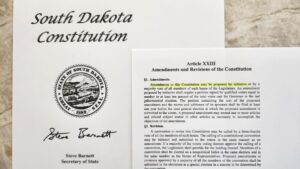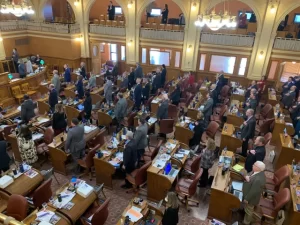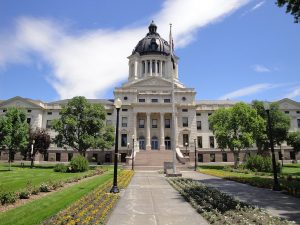There they go again. The South Dakota legislature is advancing legislation attacking our long-established initiative rights in South Dakota. They have been doing this repeatedly over the last several years. But courts and the voters have repeatedly struck down their restrictions. And a recent study indicated that 3/4ths of South Dakotans oppose any action by the legislature to limit the ballot initiative process. Sadly, our legislature is still not getting the message.
This year’s attack is HB 1244, a proposal to allow people who sign petitions to retract their signature after the fact. While that might sound innocuous, it is not. In its current form it would open the door to activities akin to jury tampering. Opponents could pressure the few petition signers sampled by the Secretary of State’s initiative validation process to withdraw their signature. It would open any and all initiatives to attack, destroying direct democracy.
South Dakota’s Proud History of Direct Democracy
South Dakota has a proud history of direct democracy where citizens get to vote on ballot issues. The state’s constitution authorizes citizens to propose changes to state statutes and the constitution through an initiative process. Citizens can put an issue on the ballot by getting tens of thousands of signatures on petitions, leading to a public vote. In fact, South Dakota was the first state to adopt initiative and referendum (putting an existing law or bill up for voter review) on a statewide level in 1898.

South Dakota Constitution
Voter Initiatives are a Crucial Component of Democracy
Voter initiatives are a crucial component of our state’s heritage, allowing citizens to take an active role in the democratic process. After all, South Dakota’s state motto is, “Under God the people rule.”
Initiatives can be especially important when the legislature seems to be out of sync with the people. They also provide an opportunity for citizens to address significant issues that the legislature may want to avoid, such as marijuana legalization, Medicaid expansion, abortion limits, establishing the minimum wage, expanding crime victims’ rights and election reform.
South Dakota voters have seen a steady flow of ballot questions over the past century. The most active period was in the 1910s when there were 54. There were 30 ballot issues in the 2010s, down a bit from 35 in the 2000s and 32 in the 1990s. The state’s voters like voting on ballot questions.
Legislative Efforts to Impede Initiatives
Regrettably, in the last couple decades the South Dakota Legislature has repeatedly attempted to create new rules that make it harder to put issues on the ballot. Their proposals include increasing the number of signatures required to place an issue on the ballot, shortening the time for gathering signatures, regulating who can gather signatures, increasing the percentage of voters required to pass an amendment and restricting out-of-state funding for ballot measures. This year’s effort to change the rules to allow petition signers to retract their signatures is a sneaky way to further their long-term goals.

The legislature has also considered imposing geographic restrictions on signature gathering and repealing the initiative process altogether. However, the courts or the people eventually put a stop to each of these hurdles.
The People and Courts Say “No” to Initiative Restrictions
The people spoke loud and clear in 2022. The legislature proposed that some constitutional amendments must have a favorable vote of 60% of voters, instead of 50%. They put their restriction on the June primary ballot thinking it would pass, but the voters overwhelmingly declined (over 67% voted “no”) to reduce their own authority to pass initiatives.

8th Circuit Court of Appeals
In February 2023, a federal appeals court handed the state another big loss. It ruled that the twelve months in advance filing deadline for proposed constitutional amendments is unjustified and unconstitutional.
But the Legislative Attacks Continue
Despite these recent setbacks, the legislature has continued to pursue more ideas for restricting initiatives. Last year, the House passed an apparently unconstitutional bill imposing geographic distribution of signatures that would have effectively killed the initiative process. Luckily, the Senate didn’t go along with them.

The legislature does not appear to trust South Dakota voters. Some legislatores resent being overruled by the people or the courts. They exhibit a “we know what’s best for you” attitude that conflicts with traditional South Dakota values and beliefs. Perhaps our broken partisan primary system is at fault; it sometimes produces ‘representatives’ who don’t truly represent the interests of all citizens.
The Initiative Process is Already Very Difficult
Legislators promoting new ballot issue hurdles often suggest that changes to the constitution should be more difficult. But passing a constitutional amendment is already very expensive and challenging.
Getting a constitutional initiative on the ballot requires valid signatures from 35,000 registered South Dakota voters. Circulators must therefore obtain at least 50,000 signatures, as many signatures cannot be proven to be valid. Perhaps because of the difficulty, the number of ballot measures in the state has been relatively stable for decades.
Even the most well-organized volunteer group does not have the time or resources to put together a successful signature drive, necessitating the use of paid signature gatherers. Paid petition carriers know how to get numerous signatures per day.
Quit Trying to Fix What Isn’t Broken
The people have spoken. South Dakota’s initiative system gives them the voice they want and that the constitution guarantees them. The legislature should stop trying to fix a problem that does not exist.
That no good bill will be up in senate state affairs on Wednesday. https://sdlegislature.gov/Session/Committee/1220/Detail If one is so inclined to tell them that HB 1244 is an attack on this process we care about, you could find them at home this weekend, call and/or email. Here’s the bill: https://sdlegislature.gov/Session/Bill/24649
Senator Nesiba,
Open primaries is the only hope for SD now. It is a much more practical solution. Many Republicans and Democrats throughout the state are trying to fix the unfair system in place. Open primaries will not hurt Democrats. Very few are elected now. If a Democratic candidate is not strong enough to be in the top two in a much fairer system, he/she has NO chance winning the general election. We would welcome your support!
“Direct democracy doesn’t work!” Senator John Wiik who also serves as Chair of the Republican Party said that on the senate floor a couple of weeks ago.
Maybe if a 100,000 of you changed your party registrations to the Democratic Party it would let them know that as a party they are wrong. Ya all put them in power. I didn’t vote for any of them. Staying in the Republican Party supports them and their party’s attack on the initiated measure process.
I couldn’t agree more Joe! It’s disheartening to see these efforts continue. All we can do is work to ensure that the legislators pushing this agenda to limit our rights be removed from office at election time.
It is appalling that this situation exists in a state where democratic values are historic and deeply ingrained. It is confusing as to how these legislators are continually re-elected by the people whose voices they do not listen to. Democratic government is designed to be simple…the people speak and legislators act on their behalf rather than establishing conditional and procedural roadblocks or simply ignoring them. Hopefully, future elections will change the current path.
Good article, wish the SDDP would get their shit together. What a dumpster fire they have been recently.
Thanks for the information! A thumbs up to South Dakota voters! Before signing petitions without understanding fully what they are about is on the voters.
I spoke against this ridiculous bill on the House floor. If an individual has ‘buyer’s remorse’ then he/she can vote no on the ballot.